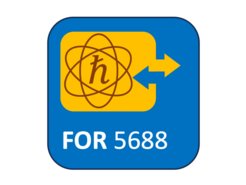New Research Unit FOR5688!
The DFG approved our new Research Unit on “Driven-dissipative many-body systems of ultracold atoms”!

This Research Unit is dedicated towards developing a better understanding of driven-dissipative quantum many-body systems with the goal of using dissipation as a novel tool for engineering complex low-entropy many-body states via cooling or projective measurements.
Abstract: Open quantum systems are ubiquitous in nature. Whatever strong efforts an experimentalist may do to isolate a quantum system from its environment, a careful attention has to be paid to dissipation, in particular in view of applications in quantum science and technology. Fundamentally, dissipation results from the exchange of information, energy, and particles with the environment. These processes can play a detrimental role; however, the coupling to engineered reservoirs can also be a powerful tool for controlling a quantum system. Of special interest are so-called driven-dissipative systems, which approach a non-equilibrium steady state (NESS). Different from a thermal state, characterized by a few thermodynamic variables (like temperature) only, such NESSs depend on the details of the environment, opening ample opportunities for tailoring their properties. A paradigmatic example is a laser, where the interplay of pumping and loss stabilizes a non-equilibrium condensate of photons. Recently, also the dissipative preparation of a Mott-insulator and a fractional-quantum-Hall droplet have been achieved in engineered photonic quantum systems.
Whether dissipation is a resource or a reality to be dealt with, it is crucial to have an accurate description
of an open many-body system. However, theoretical modeling and simulation are challenging and rely
on approximations. It is, therefore, highly desirable to build quantum simulators for open systems, with a
well characterized and tunable environment. We will pursue this goal using ultracold atoms. This will allow
us to deepen our understanding also of other open systems, to design novel control schemes, and to test
and develop suitable theoretical approaches. Ultracold atoms offer many opportunities. They are clean and can be manipulated and probed with high resolution both in space and time. Their high degree of isolation makes them excellent quantum simulators for closed systems. In close collaboration between theory and experiment, we will extend, explore, and exploit various possibilities for the controlled engineering of dissipation in these systems. We will pursue three major goals: (i) the design and experimental implementation of engineered dissipation, using atomic reservoirs, controlled 1-, 2-, and 3-particle loss, optical tweezer arrays, clock transitions, the coupling to a driven-dissipative cavity mode, as well as measurements and feedback; (ii) capitalize on the fact that the engineered reservoirs and dissipation will be well characterized and controllable, in order to use our systems as quantum simulators for open systems, e.g. for benchmarking theory or studying the impact of dissipation on transport; (iii) investigate novel approaches for the dissipative preparation of interesting target states, such as fractional quantum Hall states, cluster states, defect free Mott insulators, spontaneously formed dynamical lattices, self-driven spin pumps, and non-equilibrium Bose condensates.
Participating researchers & institutes:
- Speaker: Prof. Dr. André Eckardt (TU Berlin)
- Dr. Alexander Schnell (TU Berlin)
- Prof. Dr. Iacopo Carusotto (Università di Trento)
- Dr. Tobias Donner (ETH Zürich)
- Dr. Christof Weitenberg (Universität Hamburg)
- Prof. Dr. Oded Zilberberg (Universität Konstanz)
Further reading:
Press release on DFG website and TU Berlin












